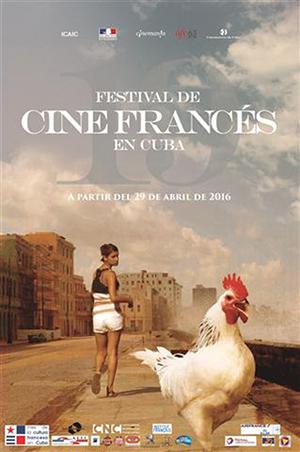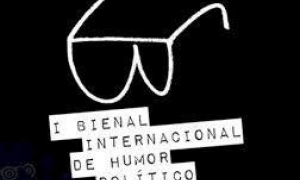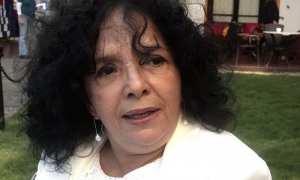
The French Film Festival returns to Cuba. Like always, this 19th edition brings with it an important selection of works reflecting the diversity of the industry, together with a delegation of directors and actors, here to present their productions.
Organizers, director Christophe Barratier and Nouredine Essadi, who founded the festival with the support of the Cinemania group, are certain of success, given Cubans' undeniable passion for French cinema.
Speaking briefly after a press conference in Havana's Hotel Telégrafo, Barratier stated, “When I arrived in Cuba for the first time in 1998 to present the film Microcosmos, it was positively received by the public, and from that moment on I decided to try to return. I was deeply touched by the Cuban public; this relationship has now turned into a love story. I'm sure that Cuba's French Film Festival is the biggest in the world in regards to audience turn-out.”
The festival - held April 29 through May 21 - is distinguished by its wide range of cinematic genres, including dramas, comedies, thrillers, biopics and documentaries.
Audiences have the opportunity to enjoy a selection of 19 films produced between 2014-2016, as well as nine restored classics.
Barratier, producer of the noteworthy documentary Microcosmos (1995), has directed three successful feature-length films, all of which premiered in Cuba; The Chorus (2004), Paris 36 (2008) and War of the Buttons (2011).
The Festival was inaugurated in Havana’s Charles Chaplin cinema with the world premier of Barratier's fourth feature-length film, L'Outsider, inspired by one of the biggest financial scandals in history, the true story of French banker Jerôme Kerviel.
The financial crisis is an appealing subject. Responding to a question during the press conference which included the entire French delegation to the festival, about the motivation behind the film, Barratier stated “I didn’t know much about banking nor was I very interested, I found out about the scandal in the press and later I met Kerviel personally. He told me everything, from the moment he joined the bank in 2000 and his dramatic rise to trader. I saw his more human side, the physiological and financial webs of the financial world, I was hooked by the story, I had to do a lot of research in order to successfully convey this world. I must add that the Société Générale is a powerful company and I encountered some obstacles. The film ends as the case begins to blow up.”
For his part, young Arthur Dupont, who plays Kerviel, described the audition process, rehearsals, meeting Kerviel personally and his interest in the multi-layered story.
A 4K HURRICANE
More than a documentary, Ouragan (Hurricane) is a spectacle, with outstanding photography and music by composer Yann Tiersen, this film entices the spectator.
Directed by Cyril Barbançan, Andy Byatt and Jacqueline Farmer, the film's world premier took place in Havana, which also saw the first ever screening of a 4K resolution movie in the Chaplin cinema.
Two of the film's creators, Cyril Barbançan and Jacqueline Farmer presented the documentary which shows the 15,000 kilometer journey of the massively destructive hurricane in outstanding detail.
Farmer noted that Ouragan is the result of a six-year project which tries to “show humans' relationship with nature, our need to understand and even control it.”
The co-director explained how she got involved in the project: “I was attracted by the prospect of seeing how this kind of meteorological phenomenon develops, given my personal experience; I am Scottish but I live in the south of France, where the strong Mistral wind constantly affects the area, greatly impacting people's lives.”
For his part, Barbançan highlighted that the film took six years to make “because we followed the route of the tropical hurricane from its start as a small cloud off the coast of Africa throughout its journey across the Atlantic Ocean.”
Cuban meteorologist Dr. José Rubiera also features in the documentary, who “provided us with a general explanation of this vast subject,” Farmer added, also noting that the team worked with “NASA, which has loads of resources and advanced technology, they helped us with the images, for example the ones taken by the reconnaissance plane entering the eye of the hurricane, and set up conversations with astronauts about Hurricane Lucy,” (which devastated El Yunque in Puerto Rico, Cuba's western province of Pinar del Río and the State of Louisiana in the United States).
MORE THAN JUST SEX AND VIOLENCE
Among French guests to the Festival is hallowed director Jean Becker, a name hard not to recognize, and filmmaker who emerged on the global stage in the 1960s with titles such as Free Escape (1964), One Deadly Summer (1983) and Elisa (1995), all of which have left their mark on French cinema.
If that weren't enough, Jean is the son of another cinema great, Jacques Becker, best known for the film Golden Helmet (1952), staring Simone Signoret.
Speaking during the press conference, Jean noted that in regards to his professional relationship with his father, “I learned everything from him; he was a magnificent man and filmmaker, with a huge heart.”
His comedy, Get Well Soon, staring Gerard Lanvin is also being screened during the festival. “I was particularly interested in this unusual story of a man who looses his memory after falling in to the River Seine. The character faces a new period in his life and the former misogynist starts to see his family in a different light.”
According to Becker, “The human relationships, how they develop throughout the story,” are what he looks for in a film, something “I inherited from my father. It’s a way of making films which appeal to people more than just sex and violence.”
DIVERSITY
Also participating in the press conference was Émilie Grandperret, who together with her father Patrick Grandperret, filmed Fui banquero (2015) in Cuba, staring famous French actor, Pierre Richard.
Among the films being premiered and screenings of those shot between 2014 and 2016, are Measure of a Man, by Stéphane Brizé, which saw Vincent Lindon win Best Actor and receive a special mention from the Ecumenical Jury at the Cannes Film Festival, and a Cesar Award for Best Actor.
Another film included in the festival is Mustang, by Turkish director Deniz Gamze Ergüven, which won 28 awards including four Cesars, five in the Valladolid Film Festival; a Discovery(best debut work) at the European Film Awards; a Goya for best European film, and has also received Oscar and Golden Globe nominations for best foreign language film.
The list continues with a range of auteur films such as The Price of Fame (Xavier Beauvois); Young and Beautiful (Francois Ozon); Marguerit (Xavier Giannoli), as well as productions based on real life stories such as the thriller The Connection (Cédric Jiménez); Once in a Lifetime (Marie-Castille Mention-Schaa) and Diplomacy (Volker Schlöndorff), inspired by true events which occurred shortly after the liberation of Paris during WWII.
Audiences will also enjoy musical-comedy The Bélier Family(Éric Lartigau), the members of which are all deaf-mutes, expect the daughter who is an exceptional singer; and Eden (Mia Hansen-Løve) about a young DJ breaking into the Paris' electronic music scene.
RESTORED CLASSICS
The public can alsowatch classics as if for the first time thanks to excellent picture and sound restoration. Nine classic French films are being screened at La Rampa cinema, with new high-quality projection equipment installed in the facility, the result of a collaborative project between Cuba and France.
These films include: Pepé Le Moko, by Julien Duvivier (1937), starring Jean Gabin; French cancan, by Jean Renoir (1954), with a stellar performance by Mexican diva María Félix; The Big Day, Jacques Tati (1949); Capitan Conan and Life and Nothing But, by Bertrand Tavernier; The Lovely Month of May, by Chris Marker and Pierre Lhomme;The Umbrellas of Cherbourg, by Jacques Demy, with Catherine Deneuve, and Melodrama by Alain Resnais.
Another one of the nine restored classics being screened is the anti-war documentary Far From Vietnam (1967) by renowned directors Claude Lelouch, Agnès Varda, Jean-Luc Godard, Chris Marker, Alain Resnais, Joris Ivens and William Klein.
The French Film Festival, now in its 19th edition, is one of the most popular on the island, only surpassed by the International Film Festival of New Latin American Cinema.
In regards to the 20th edition of the Festival, one of its organizers, Nouredine Essadi, stated that “It'll be a surprise but we will come as always for the Cuban audience, their participation, interest, and passion for French film.”






